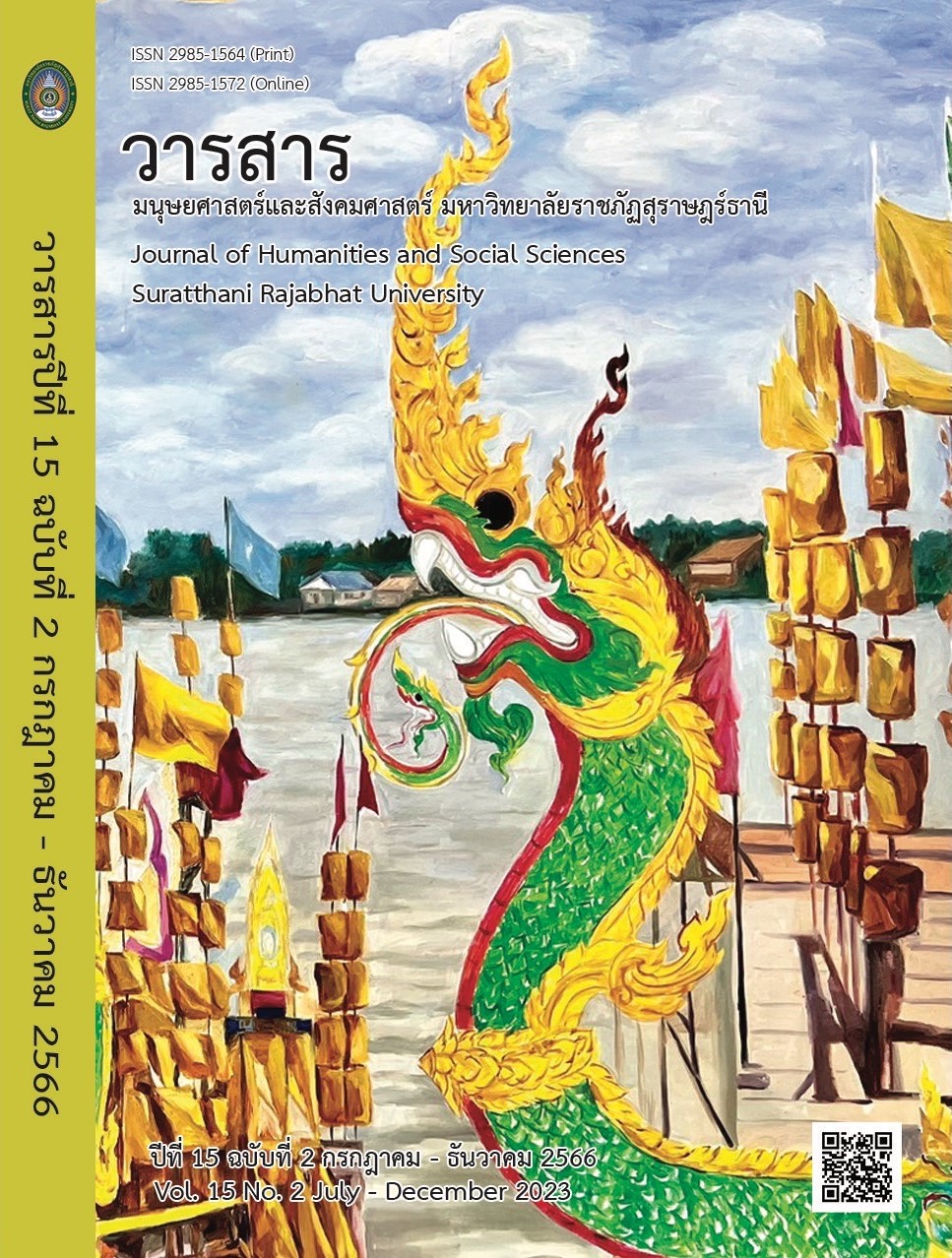The Use of English for Tourism Learning Programs to Empower People in Four Local Communities in Thailand: An Analysis of the Case Studies Based on Alan Rogers’s Concept
Main Article Content
Abstract
This academic article aims to analyze an English for Tourism
learning program used to empower the four local communities in Thailand following Alan Rogers Routes to Change concept. The data were analyzed through the English for Tourism learning program case studies available in the ThaiLIS database (Thailand Library Integrated System). As a result, the English for Tourism learning program targeted the four local communities in Thailand are prominently linked to the Routes to Change concept towards the development model called “the Early Decision-Making in the Development Route.” Additionally, this path aims to encourage the target groups and the local communities to decide their preferences before the training is provided, so the target groups can be qualified, and the local communities can be significantly empowered. Alan Rogers’s Routes to Change concept consists of six stages including 1) existing state, 2) awareness of the need to change, 3) decision-making, 4) education and training of adults (ETA), 5) action, and 6) desired change. It was found that the first and the second case studies applied Alan Rogers’s Routes to Change concept through the 3rd stage, while the third and the fourth case studies followed the concept through the 6th stage for the desired change. Therefore, the authors proposed the possible guideline for community leaders, policy makers, and learning program developers similar to the case studies’ social development stages of community development resulting in the desired changes. Moreover, stakeholders should utilize Alan Rogers’s Routes to Change concept as a platform to
develop the English for Tourism learning program for training stakeholders, promoting opportunities, and encouraging collaboration throughout the
development process.
Article Details

This work is licensed under a Creative Commons Attribution-NonCommercial-NoDerivatives 4.0 International License.
All published manuscripts have been verified by peer-peer professors in the fields of humanities and social sciences. Reprinting of the article must be authorized by the editorial staff.
References
Atibaedya, A. (2010). Research Report of a Self-directed Learning Model for
Communicative English Using for Eco-Tourism and Cultural Heritage
Tourism in Tha-ka, Amphawa District, Samut-Songkhram Province.
Bangkok: Suan Sunandha Rajabhat University.
Bhasin, H. (2020, June 30). What is Training Program? Definition, Meaning and
Types. https://www.marketing91.com/trainingprogram
Daggol, G. D. (2020). Perceived Academic Motivation and Learner Empowerment
Levels of EFL Students in Turkish Context. Participatory educational
Research (PER), 7(3), 21-37.
Ilyosovna, N. (2020). The Importance of the English Language. International
Journal on Orange Technologies, 2(1), 22-24.
Kuosuwan, B. (2016). The Readiness of English Communication Skills of Tourism
Employees in Bangkok for Entering the Asean Community. International
Journal of Environmental and Science Education, 11(18), 12904-
Langenbach, M. (1993). Curriculum Model in Adult Education. Florida: Krieger
Publishing Company.
Lertchalermtipakoon, P., Wongsubun, U. & Kawinkoonlasate, P. (2021). Need
Analysis: English Language Use by Students in the Tourism and
Hospitality and Industry. Canadian Center of Science and Education,
(3), 59-71. http://doi.org/10.5539/elt.v14n3p59
Lucchetti, V. G. & Font, X. (2013). Community Based Tourism: Critical Success
Factors. http://www.icrtourism.org
Nitikasetsoontorn, S. (2015). The Success Factors of Community-Based tourism
in Thailand. Nida development Journal, 55(2), 24-58.
Nishanthi, R. (2018). The Importance of Learning English in Today’s World.
International Journal of Trend in Scientific Research and Development,
(1), 871-874.
Nomnian, S., Trupp, A., Niyomthong, W., Tangcharoensathaporn, P., & Charornkongka,
A. (2020). Language and Community-Based Tourism: Use, Needs,
Dependency, and Limitations. Austrian Journal of South-East Asian
Studies, 13(1), 57-79.
Phandee, S. (2016). Research Report of Communicative English Skills Development
for Local People in Samutprakan Province. Bangkok: Dhonburi
Rajabhat University.
Rogers, A. (1994). Adults Learning for Development. London: Cassell Education
Limited.
Rao, P. (2019). The Role of English as a Global Language. Research Journal of
English, 4(1), 65-79.
Sugunto, G. (2017). Research Report of the Development of English Learning
Package for Tourism through Tourism Activities to Mahouts,
Children, and Young Students in Meayaow Sub-district, Chiang Rai
Province. Chiang Rai Province: Mahachulalongkornrajavidyalaya
University.
Supasiriwittaya, S. (2014). The Development of an English Agro-tourism
Handbook for Hosts at Klong Mahasawat Community, Phuttamonthon
District, Nakhon Pathom. Dissertation, M.A. (English). Nakhon
Pathom Rajabhat University.
Sutresna, I.B., Suyana U.I. M., Saskara, I. A. N. & Setiari, N. P. W. (2019). Community
Based Tourism as Sustainable Tourism Support. Russian Journal of
Agricultural and Socio-Economic Sciences, 10(94), 70-78.
Suwanpakdee, A. (2018, July 19-20). English as Success Factor for Community
Based Tourism in Thailand (Paper presentation). The 3rd International
Conference on Language, Literature and Cultural Studies (pp. 458-
. Thailand: https://www.researchgate.net/publication/350754279
Surawattananon, N. (2019). Tourism and Its Role in Driving the Thai Economy.
https://www.bot.or.th/Thai/ResearchAndPublications/DocLib_/
Article_29Oct2019.pdf
Surawattananon, N., Reancharoen, T., Prajongkarn, W., Chunanantatham, S.,
Simakorn, Y., & Gultawatvichai, P. (2021). Revitalizing Thailand’s
Tourism Sector. https://www.bot.or.th/Thai/MonetaryPolicy/Economic
Conditions/AAA/250624_WhitepaperVISA
Zahedpisheh, N., Bakar, A., Zulqarnain, B., Saffari, N. (2017). English for Tourism
and Hospitality Purposes (ETP). English Language Teaching, 10(90),
-94.


